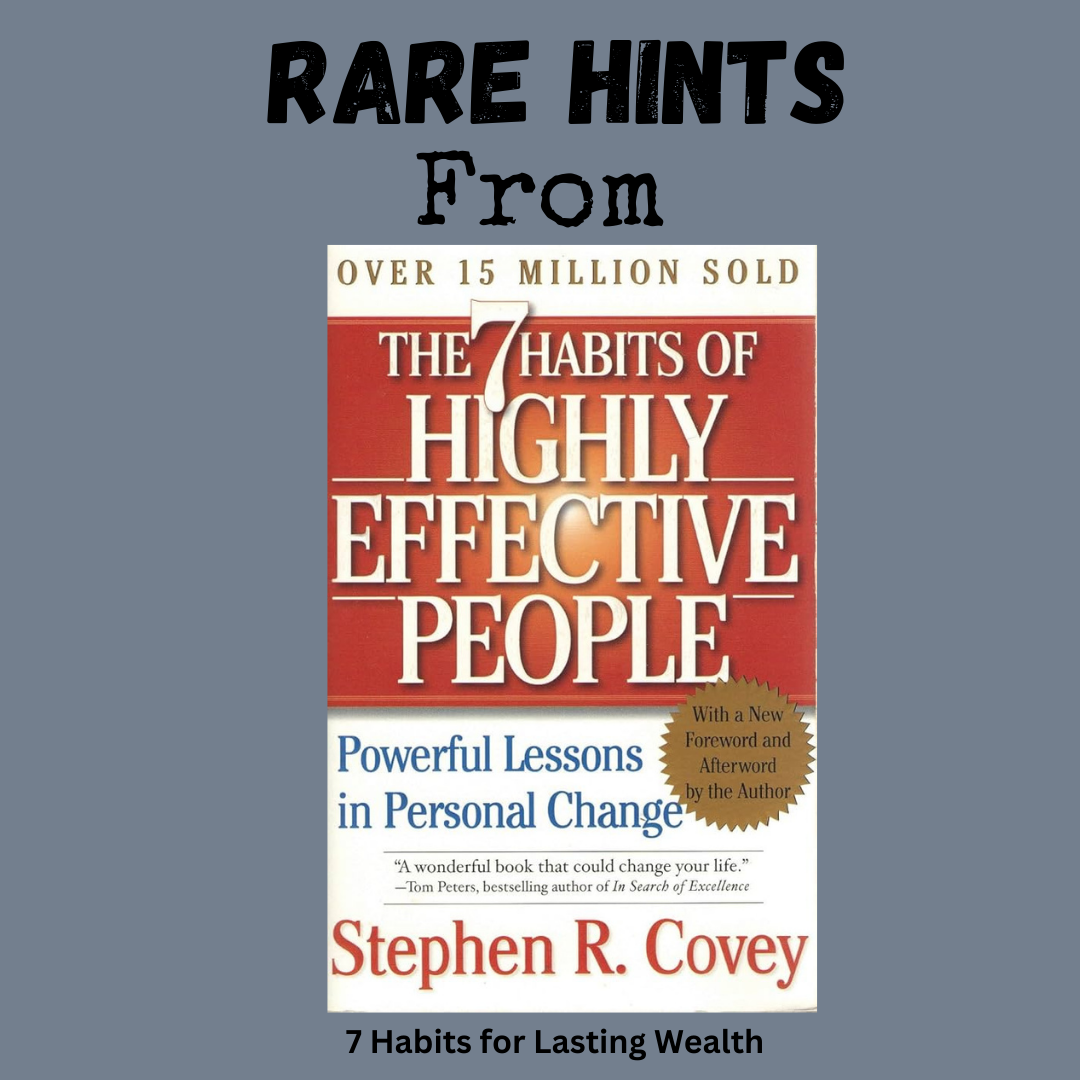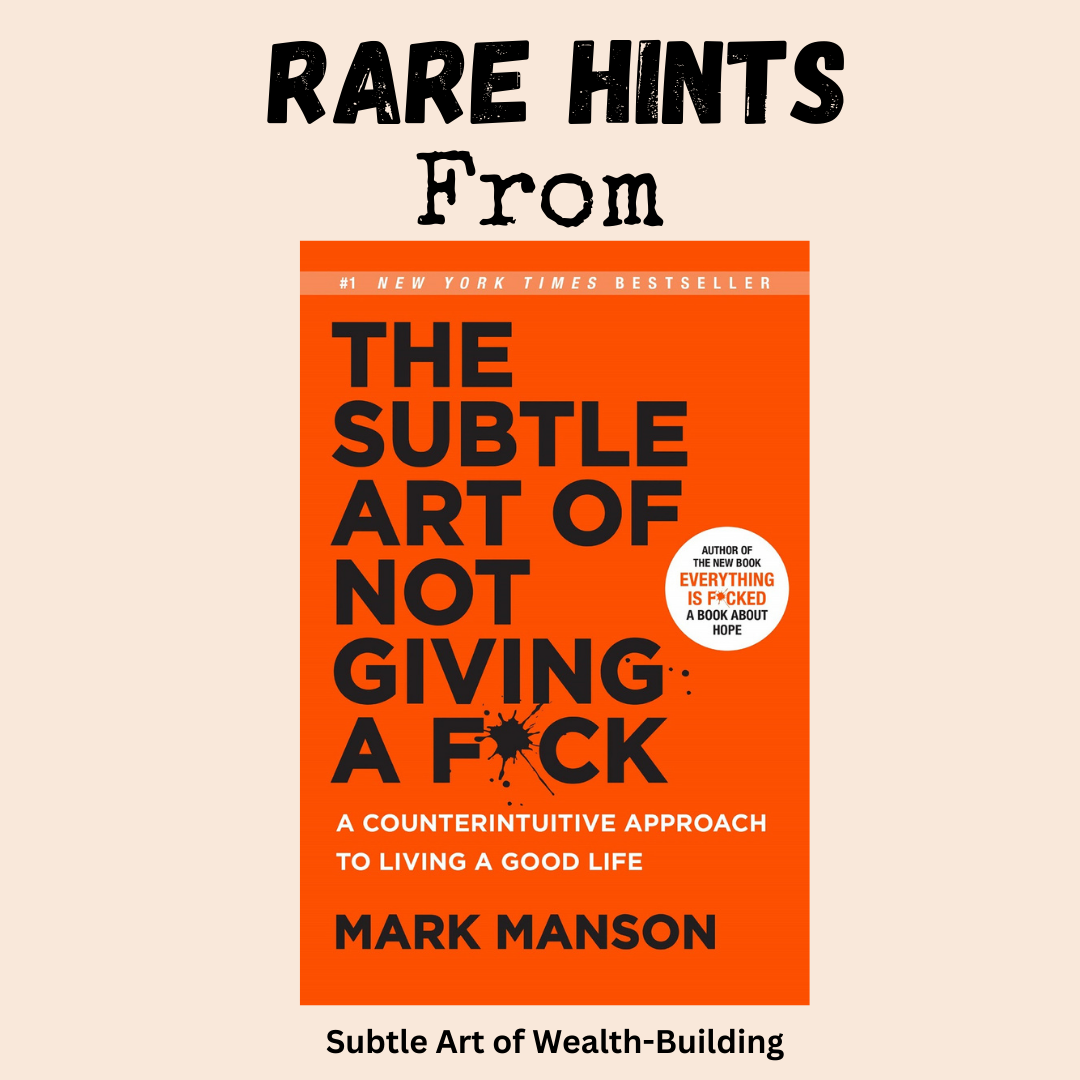Struggling to Get Ahead Financially? The Problem Might Not Be Your Budget—It Might Be Your Mindset
Ever feel like you’re doing everything right but still not making real financial progress?
- You’ve tried budgeting, but unexpected expenses always throw you off track.
- You’ve dabbled in investing, but you’re still unsure what strategy works best.
- You’ve read finance books, yet nothing seems to stick long-term.
If this sounds familiar, you don’t need more quick-fix tips—you need a proven system.
That’s exactly what The 7 Habits of Highly Effective People by Stephen R. Covey provides.
While this book isn’t specifically about money, it lays out a powerful mindset shift that can help you master your finances, make smarter decisions, and build lasting wealth.
Let’s break down how Covey’s principles can transform your financial life.
🧠 The Core Idea: Financial Success Starts with the Right Habits
Most people believe building wealth requires:
✅ More income
✅ Better investments
✅ The right financial tools
But Covey flips the script. He teaches that:
“Success isn’t about external circumstances—it’s about mastering internal habits.”
In other words, lasting wealth isn’t just about earning more—it’s about thinking, planning, and acting more effectively.
💡 Why This Matters for Wealth-Building:
- Your mindset affects your money habits.
- Without structure, even high earners struggle financially.
- By applying these 7 habits, you can take control of your financial future.
🚀 Key Financial Lessons from The 7 Habits of Highly Effective People
1️⃣ Be Proactive: Take Ownership of Your Finances
Covey’s first habit is about shifting from blame to responsibility.
“Stop blaming the economy, your job, or your past. Own your financial future.”
Many people say:
- “I can’t save because my job doesn’t pay enough.”
- “Investing is risky—I’ll just wait until I have more money.”
- “I’ll start budgeting next year when things settle down.”
Reality check? These are excuses. Your financial situation won’t change until YOU take control.
🔥 How to Apply This Today:
✅ Track your spending—know exactly where your money goes.
✅ Set clear financial goals—decide what you want to achieve.
✅ Create an action plan—list the steps you need to take.
💡 Example: Instead of saying, “I can’t afford to invest,” start with $10/month in a low-cost index fund. Small steps lead to big progress.
2️⃣ Begin with the End in Mind: Define Your Financial Vision
Most people set vague financial goals. They say:
❌ “I want to be rich.”
❌ “I need to save more money.”
❌ “I should start investing.”
But without a clear target, you’ll drift aimlessly.
Covey’s second habit teaches that wealth-building starts with a vision.
“If you don’t define success, how will you know when you’ve achieved it?”
🔥 How to Apply This Today:
✅ Write down your “wealth vision.” How much money do you need to feel secure?
✅ Set specific financial goals—like saving $100,000 in 5 years or paying off debt by 2027.
✅ Reverse-engineer your path. Break big goals into smaller, actionable steps.
💡 Example: If you want $1M in investments by 2040, calculate how much to save/invest monthly to hit that goal.
3️⃣ Put First Things First: Prioritize Your Financial Future
Covey explains that urgent tasks (paying bills, handling crises) often distract us from what truly matters (long-term financial planning).
“Wealth isn’t built by reacting to emergencies—it’s built by prioritizing what matters most.”
Many people spend first, then save what’s left. Instead, you should:
🔥 How to Apply This Today:
✅ Pay yourself first. Automate savings before spending on anything else.
✅ Block out time for “money management.” Track expenses, research investments, and plan ahead.
✅ Avoid lifestyle inflation. Increase your savings rate as your income grows.
💡 Example: Instead of “hoping to save at the end of the month,” automate a percentage of your paycheck to savings/investing.
4️⃣ Think Win-Win: Build Wealth Without Compromise
Many people think wealth is a zero-sum game—that someone else must lose for them to win.
Covey rejects this mindset. Win-win thinking creates opportunities for everyone.
“Successful people focus on mutual benefit—whether in business, investing, or relationships.”
🔥 How to Apply This Today:
✅ Negotiate win-win deals. Whether it’s salary, business, or real estate, aim for fair agreements.
✅ Create passive income streams. Find ways to make money that provide value to others.
✅ Practice financial generosity. Helping others (mentorship, charity) often leads to unexpected rewards.
💡 Example: Instead of haggling for the lowest price, build relationships with service providers, partners, and investors for long-term success.
5️⃣ Seek First to Understand, Then to Be Understood: Learn Before Acting
Most financial mistakes happen because people act before they fully understand.
Covey teaches that effective people listen, research, and learn before making decisions.
“Before making financial choices, gather knowledge and seek expert advice.”
🔥 How to Apply This Today:
✅ Before investing, research the company or asset.
✅ Before buying a house, study the market and mortgage rates.
✅ Before negotiating, listen and understand the other party’s needs.
💡 Example: Instead of jumping into crypto or stock trading based on hype, study proven investing strategies.
6️⃣ Synergize: Collaborate to Grow Your Wealth Faster
Wealth-building is easier when you leverage partnerships, mentors, and communities.
“Success is rarely a solo journey—work with others to accelerate growth.”
🔥 How to Apply This Today:
✅ Join financial communities—mastermind groups, investment clubs, or business networks.
✅ Learn from mentors who have achieved financial success.
✅ Consider partnerships—business, real estate, or investment collaborations.
💡 Example: A real estate investor who teams up with an experienced mentor can avoid costly mistakes.
7️⃣ Sharpen the Saw: Keep Learning and Growing Financially
Covey’s final habit is about continuous improvement.
“The world changes—those who adapt and learn succeed.”
🔥 How to Apply This Today:
✅ Read finance books & follow expert blogs.
✅ Take courses on investing, business, or wealth-building.
✅ Set yearly financial growth goals.
💡 Example: If you’re stuck at a low salary, upgrade your skills (coding, sales, leadership) to increase your earning potential.
🛠️ How to Apply The 7 Habits to Your Finances Today
✅ Step 1: Take Responsibility—stop making excuses, start taking action.
✅ Step 2: Set a Clear Vision—define what financial success means for you.
✅ Step 3: Prioritize Long-Term Wealth—put investing and savings first.
✅ Step 4: Build Relationships—leverage networking, partnerships, and collaboration.
✅ Step 5: Keep Learning—commit to lifelong financial education.
⚠️ Common Financial Mistakes to Avoid
❌ Blaming external factors for money struggles.
❌ Not setting clear financial goals.
❌ Focusing on urgent expenses instead of long-term wealth-building.
❌ Thinking financial success is purely about income, not habits.
❌ Failing to invest in personal growth.
🎤 Your Turn!
👉 Which of these habits will you start applying to your finances today? Drop a comment below!
🚀 If this helped reframe your financial mindset, share it with a friend!
Remember: Wealth isn’t built overnight—but with the right habits, it’s inevitable. 💰








Leave a Comment